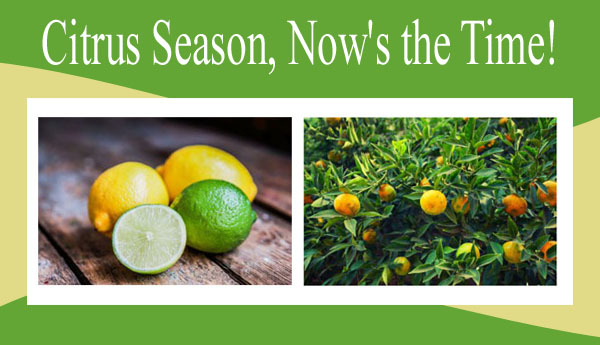Newsletter Articles
Citrus Season, Now’s the Time!
By David S.
Meyer Lemon, Eureka Lemon, Mexican Limes, are each part of the large variety of citrus that Green Thumb Nursery offers. Others include Bears Lime, Tango Mandarin Dwarf, Tango Mandarin Morro, Blood Orange, and Gold Nugget Tangerine. Any of these make an excellent addition to a garden or as part of a beneficial landscape. Some citrus trees are dwarfs and make excellent hedgerows which act as a wind block and can help to diminish street noise or eyesores. The advantage is that these all produce viable fruit that makes a beautiful addition to your home garden yield and right now is an excellent time to plant citrus trees.
Tips and Products that Make Growing Citrus Successful
Citrus trees need a warm climate, and they grow well in USDA Hardiness Zones 9, 10, and 11. For the most part, this is most of Southern California. That’s good news for anyone who’d love to discover the joy of picking their own oranges, tangerines, lemons or limes. As lovely as that sounds, growing citrus has a few challenges. Not to worry though, because, at Green Thumb Nursery, we make it easy to succeed at growing your own citrus orchard. One challenge is soil quality, and another is pest management. Below are our answers to these challenges and of course all of our trees come with our expert, friendly advice.
The Soil – Citrus trees love acidic soils, and they prefer a pH range of 5.5-6.5. An excellent tip to growing beautiful citrus trees is to start with a soil pH test and then amend as needed. This is true whether you are growing trees in the ground or in a decorative pot.
Soil for citrus is divided into two concerns — The “before you start the process” and the “ongoing after you plant care.”
Before You Plant
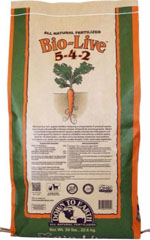 Before you plant citrus amend the soil. A good product is Down to Earth’s Bio-Live 5-4-2 Fertilizer which has a bumped up levels for both Nitrogen and Phosphate and a decrease in Potassium. The minerals in this soil product are only one phase of the goodness found therein. This is also a bio-live product which means that the soil is full of beneficial organisms and that is important for citrus trees. The result is that these little creatures help to improve the soil structure so that the tree has better access to nutrients and other soil resources including water retention at the soil level. Also, Bio-Live 5-4-2 is entirely organic.
Before you plant citrus amend the soil. A good product is Down to Earth’s Bio-Live 5-4-2 Fertilizer which has a bumped up levels for both Nitrogen and Phosphate and a decrease in Potassium. The minerals in this soil product are only one phase of the goodness found therein. This is also a bio-live product which means that the soil is full of beneficial organisms and that is important for citrus trees. The result is that these little creatures help to improve the soil structure so that the tree has better access to nutrients and other soil resources including water retention at the soil level. Also, Bio-Live 5-4-2 is entirely organic.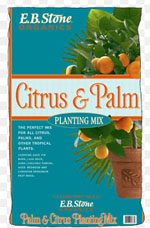
Another alternative to Bio-Live 5-4-2 is E.B. Stone – Citrus & Palm Soil which is an organic product that offers a blend of ingredients that improve soil aeration and water retention. The mix of fir bark, lava rock, and sphagnum moss makes a wonderful base for creating the perfect citrus soil. It is best used with a citrus fertilizer.
After You Plant Care
 Once the trees are established, you would need an after planting care product, such as Down to Earth’s Citrus Mix 6-3-3. The Citrus 6-3-3 bumps up the nitrogen level helping the tree expand in height and spread out its canopy. It also levels the phosphate while increasing the potassium for even growth and the creation of stronger branches and deep root systems. The Citrus Mix 6-3-3 is a bloom builder which means better fruit production and yields.
Once the trees are established, you would need an after planting care product, such as Down to Earth’s Citrus Mix 6-3-3. The Citrus 6-3-3 bumps up the nitrogen level helping the tree expand in height and spread out its canopy. It also levels the phosphate while increasing the potassium for even growth and the creation of stronger branches and deep root systems. The Citrus Mix 6-3-3 is a bloom builder which means better fruit production and yields.
The real secret to successfully growing citrus is all in the soil. Happy trees grow best in soil that is prepared for them and then amended as they grow. Like other garden plants, citrus trees also have their share of pest issues. Leafminers are a common pest that has developed a way to make the plant protect them as they grow. We have many organic pest control solutions that are perfect for citrus and a few that are not organic that work well on citrus too.
Pest Control – Organic and Non-organic
They key with pest control is to prevent the infestation before it becomes an epidemic. The following products help you to do just that.
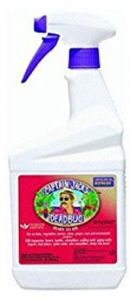 Captain Jacks Dead Bug Brew is a perfect tool to combat Leafminers – this is an organic product that uses beneficial bacteria that prey upon the leaf miners. The pest is usually a small 2mm moth that lays eggs on citrus, but there are also beetles and flies that are leafminers too. When the eggs hatch the small larva burrow into the leaves and take up residence between the top and bottom layers of the leaves. The leaves actually protect the larva from most predators, so it is essential to spray citrus with Captain Jack’s Dead Bug Brew after the trees have blossomed and while the tree is putting on leaves. This is a product that can harm bees, so that is why it is best used after the blossoming period as bees are then not attracted to the tree.
Captain Jacks Dead Bug Brew is a perfect tool to combat Leafminers – this is an organic product that uses beneficial bacteria that prey upon the leaf miners. The pest is usually a small 2mm moth that lays eggs on citrus, but there are also beetles and flies that are leafminers too. When the eggs hatch the small larva burrow into the leaves and take up residence between the top and bottom layers of the leaves. The leaves actually protect the larva from most predators, so it is essential to spray citrus with Captain Jack’s Dead Bug Brew after the trees have blossomed and while the tree is putting on leaves. This is a product that can harm bees, so that is why it is best used after the blossoming period as bees are then not attracted to the tree.
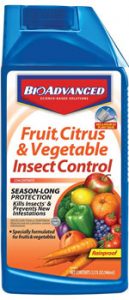 Systemic Bioadvanced – Fruit, Citrus & Vegetable Insect Control is another option but is non-organic. A systemic is not a contact pesticide and therefore is generally not a significant threat to bees. A systemic pest control product works on pests that bore into the plant and feed on plant sap and juices. Leafminers, stink bugs, and hemipterans are prime targets of systemic pesticides. The product is mixed in water, and the solution is applied to the base of the tree. The tree will take in the water with the systemic, and as insects feed on the tree, they die.
Systemic Bioadvanced – Fruit, Citrus & Vegetable Insect Control is another option but is non-organic. A systemic is not a contact pesticide and therefore is generally not a significant threat to bees. A systemic pest control product works on pests that bore into the plant and feed on plant sap and juices. Leafminers, stink bugs, and hemipterans are prime targets of systemic pesticides. The product is mixed in water, and the solution is applied to the base of the tree. The tree will take in the water with the systemic, and as insects feed on the tree, they die.
Remember that once you address the soil and take the time to prevent pest control issues, growing citrus is relatively easy. We are fond of the phrase, “grow what you eat,” and adding citrus to your yard is a fantastic way to add homegrown fruit to your diet.
Remember that Citrus trees are very popular and as such, plants, trees, and live-insects are in-demand products and their availability changes daily for each of our five store locations throughout Southern California. If you are interested in a particular plant, citrus tree, or product featured in our garden newsletter, it is always best to call ahead and check if it is available.
Do you like what you see? Sign up for our weekly newsletter to get content like this every week!

